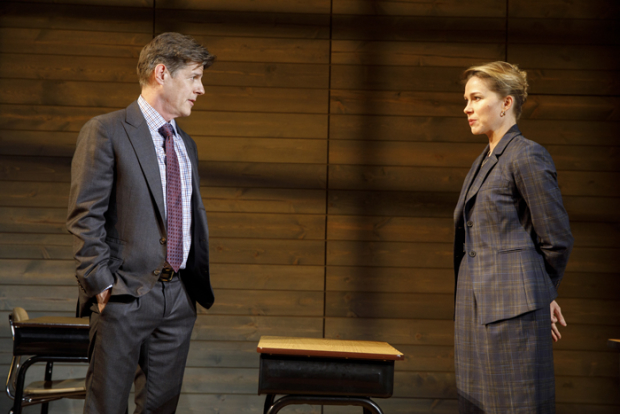A New Jay Gatsby Hears the Siren Call of Dan Cody's Yacht
Anthony Giardina riffs on ”The Great Gatsby” for his world-premiere play with Manhattan Theatre Club.

(© Joan Marcus)
Two neighboring Boston suburbs are contemplating a public school merger. For the blue-collar kids of Patchett, the merger could be their ticket to a quality four-year college, successful careers, and everything else associated with the traditional American dream. For the privileged kids of Stillwell, the merger would only dilute their wealth, beauty, and Ivy League marketability — at least according to Kevin O'Neill (Rick Holmes) a wealthy money manager who transformed himself from a James Gatz to a Jay Gatsby with nothing but the vision of Dan Cody's Yacht in the distance.
Kevin finds himself at the center of Anthony Giardina's Great Gatsby metaphor of a play, now making its Manhattan Theatre Club world premiere at New York City Center — Stage I with director Doug Hughes at the helm. Dig back through your high school English notes and you might recall the section of the F. Scott Fitzgerald novel in which penniless North Dakota native James Gatz sets his sights on a yacht owned by copper mogul Dan Cody and maneuvers his way into Cody's elite society.
Chances are your English teacher didn't frame this portion of The Great Gatsby as an exemplar of aspirational visualization, but that's what it's been for Kevin. And he proudly asserts as much to his son's English teacher Cara Russo (Kristen Bush) — a Stillwell teacher who lives in Patchett with a high-school-age daughter of her own, and who just gave Kevin's lazy, overprivileged son an F on his Great Gatsby paper (John Kroft plays Kevin's son Conor with a fixed air of "whatever" slung over his shoulder).
"Are you teaching them to hate money?" Kevin pompously asks Cara before bribing her for a grade change (Holmes delivering his best charming assh*le routine, only to be met with Bush's unflappable stoicism). What Kevin is really there to do, however, is offer the "Incorruptible Cara Russo" his financial "expertise" to make her boat loads of cash in exchange for her retracting her support for the school merger. With all that money she could move to Stillwell and buy her daughter the future she doesn't have in Patchett — and perhaps acquire some company up to the elitist standards she's tried to convince herself she doesn't have (Catherine Zuber and John Lee Beatty subtly drawing the class divide between Stillwell and Patchett in their respective costume and set designs). It's the Dan Cody's Yacht moment she never knew she wanted, but the offer turns out to be quite tempting.
The scenario paves a clear path for Giardina to illustrate how easily the supposedly "incorruptible" can be corrupted. Striving for personal advancement, safeguarding our children's futures, pulling ourselves up by our bootstraps: Kevin drops all the sound bites that come around every election cycle to reassure us that capitalism lines up neatly with morality — though of course that's been proven false time and time again. It's a fascinating game of cognitive dissonance and one that Ayad Akhtar proved belongs onstage in his currently Tony-nominated play Junk (which Hughes also directed), while Joshua Harmon expertly explored the class divisions in our educational system with his Drama Desk Award-winning play Admissions. Giardina's play ventures into similar territory, but with a set of stakes that are never convincing enough to make us see his story as anything but a thought experiment in an overly controlled vacuum.
What if Cara's gifted daughter Angela (a wryly funny Casey Whyland) could only be funneled into her dream school from the Stillwell public school? What if illicitly acquired money were Angela's only way out the food service industry, not to mention Cara's only mode of escaping a life highlighted by Friday night margarita dates with her working-class friend Cathy (Roxanna Hope Radja settling into her thick Bahston accent for a character who turns out to be woefully neglected)?
Perhaps if these things were unequivocally true, we'd feel the pressure that the "Incorruptible Cara Russo" feels to corrupt. In fact, we really only need to comprehend why Cara has come to believe that all of these things are unequivocally true (we come closest in a second-act mother-daughter scene shared by Whyland and Bush, which is by far the most authentic and well-acted). But the astute, intelligent woman we're introduced to in Cara's first meeting with Kevin melts into a helpless puddle of ineptitude at the sound of the word "derivatives," and rarely displays the powers of critical thinking we're so often told she has. The unfortunate by-product is that rather than a story about a moral bulwark manipulated by a flawed system, we get a story about a gullible woman manipulated by a domineering man. We've seen that story before, and I think we're ready for a new one.









